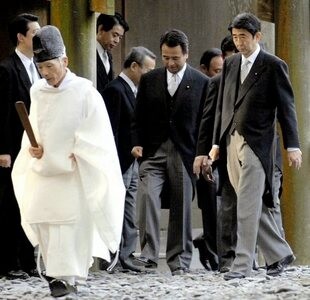hankyoreh
Links to other country sites 다른 나라 사이트 링크
10-year-old transcript carries Japan PM’s denial of ‘comfort women’

Records have resurfaced that show Japanese prime minister Abe Shinzo has long denied Japanese military involvement in forcibly rounding up women to be sex slaves during World War II.
Statements made by Abe and his cabinet last week said World War II-era documentation provided "no evidence" that foreign women were forcibly recruited into being so-called "comfort women" for the Japanese military. Up to 200,000 of such women, most of them ethnically Korean, were made to serve as sex slaves during the war. The Japanese government has never issued an official apology despite increased international pressure.
Abe’s statements made ten years ago on the subject were printed in a record of a 1997 lecture and question-and-answer session sponsored by conservative members of Japan’s ruling Liberal Democratic Party (LDP). The record, titled Doubts About History Textbooks and published in December 1997 by Tendensha Publishing, includes quotes from Abe in his capacity as the conservative group’s general secretary.
Following a lecture in April 1997 by former Deputy Chief Cabinet Secretary Nobuo Ishahara, Abe, speaking about Korean comfort women, says, "They claim it was because of Confucianism that they were forced to maintain their silence for 50 years, but I doubt that is really true."
"Korea has gisaeng houses," Abe is quoted as saying, or places where men go to watch traditional female entertainers and in some cases arrange sexual meetings on the side, similar to the Japanese geisha tradition.
In that effect, Abe goes on to call the idea that comfort women were forcibly recruited as "something that could just never happen." Abe then refers to the allowance of the existence of gisaeng as "something that had permeated life [in South Korea] to a considerable degree."
Abe is quoted as saying, "If [the women] had really been forcibly dragged away, you would expect their families or others close to them would have known about it, so I have to really wonder why nothing was mentioned [about the comfort women] at the time of the signing of the 1965 Korea-Japan treaty, when [the two countries] were in such a state of harsh confrontation," he said. "Many of the people who say they were comfort women and are making demands are lying."
Speaking about the Kono Statement, issued on August 4, 1993 and the fullest admission to date by a government official that the Japanese military coerced females into being comfort women, Abe said the statement "recognized there was direct involvement by the military and officialdom, based on interviews with only 16 individuals and without providing any physical evidence." He went on to say the Kono Statement was "less about facts and more about diplomacy" between Korea and Japan at a time when the two countries had a good "atmosphere" between them.
Regarding references to the comfort women in Japanese textbooks, he said that "rape is clearly sexual violence, but that’s entirely different from what is referred to as ‘comfort women.’ It is farfetched to say that we should teach about comfort women as a means of teaching about sexual violence."
Please direct questions or comments to [englishhani@hani.co.kr]
Editorial・opinion
![[Guest essay] Maybe Korea’s rapid population decline is an opportunity, not a crisis [Guest essay] Maybe Korea’s rapid population decline is an opportunity, not a crisis](https://flexible.img.hani.co.kr/flexible/normal/500/300/imgdb/original/2024/0430/9417144634983596.jpg) [Guest essay] Maybe Korea’s rapid population decline is an opportunity, not a crisis
[Guest essay] Maybe Korea’s rapid population decline is an opportunity, not a crisis![[Column] Can Yoon steer diplomacy with Russia, China back on track? [Column] Can Yoon steer diplomacy with Russia, China back on track?](https://flexible.img.hani.co.kr/flexible/normal/500/300/imgdb/original/2024/0430/1617144616798244.jpg) [Column] Can Yoon steer diplomacy with Russia, China back on track?
[Column] Can Yoon steer diplomacy with Russia, China back on track?- [Column] Season 2 of special prosecutor probe may be coming to Korea soon
- [Column] Park Geun-hye déjà vu in Yoon Suk-yeol
- [Editorial] New weight of N. Korea’s nuclear threats makes dialogue all the more urgent
- [Guest essay] The real reason Korea’s new right wants to dub Rhee a founding father
- [Column] ‘Choson’: Is it time we start referring to N. Korea in its own terms?
- [Editorial] Japan’s rewriting of history with Korea has gone too far
- [Column] The president’s questionable capacity for dialogue
- [Column] Are chaebol firms just pizza pies for families to divvy up as they please?
Most viewed articles
- 1First meeting between Yoon, Lee in 2 years ends without compromise or agreement
- 2Under conservative chief, Korea’s TRC brands teenage wartime massacre victims as traitors
- 3Months and months of overdue wages are pushing migrant workers in Korea into debt
- 4[Guest essay] Maybe Korea’s rapid population decline is an opportunity, not a crisis
- 5[Column] Can Yoon steer diplomacy with Russia, China back on track?
- 6‘We must say no’: Seoul defense chief on Korean, USFK involvement in hypothetical Taiwan crisis
- 7Dermatology, plastic surgery drove record medical tourism to Korea in 2023
- 8After election rout, Yoon’s left with 3 choices for dealing with the opposition
- 9Two factors that’ll decide if Korea’s economy keeps on its upward trend
- 10[Column] Behind factional animus of Korean politics, victim mentality festers